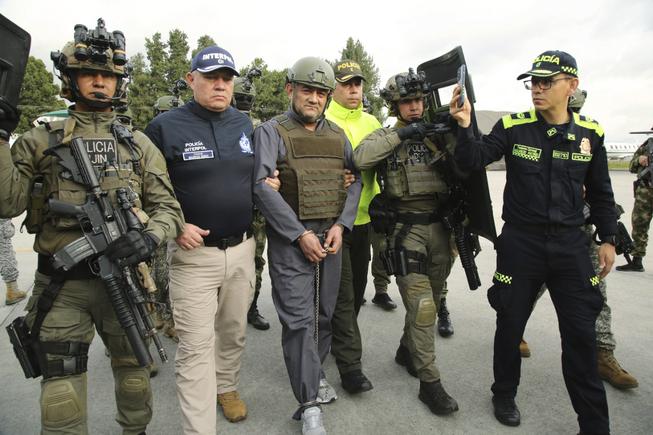
Colombian presidential press office
In this photo released by the Colombian Presidential Press Office, police escort Dairo Antonio Usuga, center, also known as “Otoniel,” leader of the violent Clan del Golfo cartel prior to his extradition to the U.S., at a military airport in Bogota, Colombia, Wednesday, May 4, 2022.
Wednesday, May 4, 2022 | 5:47 p.m.
BOGOTA, Colombia — Colombia extradited the alleged head of the feared Gulf Clan, who had been the country’s most wanted drug lord before his capture, to the United States Wednesday where he faces indictments in three federal courts.
Colombian President Iván Duque said Dairo Antonio Úsuga David is “comparable only to Pablo Escobar,” referring to the late former head of the Medellin drug cartel.
“He is not only the most dangerous drug trafficker in the world, but he is murderer of social leaders, abuser of boys, girls and adolescents, a murderer of policemen,” Duque said accompanied by Colombia’s military leaders whom he congratulated for guarding Úsuga David and capturing him in October 2021.
The former rural warlord, better known by his alias Otoniel, had stayed on the run for more than a decade by corrupting state officials and aligning himself with combatants on the left and right. He was transferred Wednesday in handcuffs and wearing a helmet and a bulletproof vest from a prison in Bogotá to a heavily guarded military transport air field.
He’s long been a fixture on the U.S. Drug Enforcement Administration’s most-wanted list. He was first indicted in 2009, in Manhattan federal court, on narcotics charges and for allegedly providing assistance to a far-right paramilitary group designated a terrorist organization by the U.S. government. Later indictments in Brooklyn and Miami federal courts accused him of importing into the U.S. at least 73 metric tons of cocaine between 2003 and 2014 through countries including Venezuela, Guatemala, Mexico, Panama, and Honduras.
Úsuga David’s also cycled through the ranks of several guerrilla groups, most recently claiming to lead the Gaitanist Self Defense Forces of Colombia, after a mid-20th century Colombian leftist firebrand.
The Colombian government began the capo’s extradition after the State Council lifted a provisional suspension of an order by Duque endorsing the move. The high court dismissed a petition from a group of Úsuga David’s victims who argued that his extradition would violate their rights to justice and reparation. They wanted him to first face the more than 128 proceedings against him in Colombia. .
Duque said that from the United States, Úsuga would continue collaborating with the Colombian authorities in the investigations against him and once he completes his sentences for drug trafficking, he will return to “Colombia to pay for the crimes he committed.”
The Gulf Clan’s army of assassins terrorized much of northern Colombia to gain control of major cocaine smuggling routes through thick jungles north to Central America and onto the U.S.
As he defied authorities for years, his legend as a bandit grew alongside the horror stories told by Colombian authorities of the many underage women he and his cohorts allegedly abused sexually.

